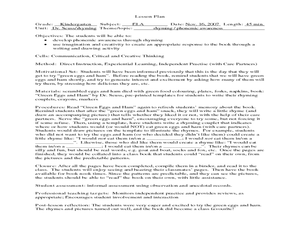Curated OER
Mmm, Mmm ... Good!
Help primary students learn the /m/ sound. As they listen as the teacher introduces the "Secret Code" of language they will practice the /m/ sound by rubbing their tummies as if eating something good. They also practice hearing and...
Curated OER
Icky Fingers
Which i sound is used in the word icky? Kindergarteners and first graders listen to the short /i/ sound. They practice shaking their fingers to indicate icky when they hear the target sound. Then they practice reading a poster with the...
Curated OER
Iggy the Penguin
Take your young word detectives on a hunt for the /i/ sound. Use the tongue twister about Iggy the penguin to help learners identify the target sound. Then learners are given several words, and they have to use their detective skills to...
Curated OER
OW! I stubbed by toe
Drill and practice the /ow/ sound! Kids practice recognizing pictures that begin with the ou=/ou/ correspondence. They experience a letterbox lesson to help implement this task before them as well as reading the story, The Napping House,...
Curated OER
Reintroduce /c/
Do you c what I c? Use these strategies combining pronunciation, letter recognition, and initial phoneme examples to examine the letter c with kindergartners. Scholars examine the letter shape and listen to you pronounce the soft...
Curated OER
Chocolate Choo Choo Chicken
Learners explore phonemes. They discuss the digraph /ch/. Students learn a tongue twister to help them identify the digraph /ch/. They discuss the sound created by the digraph. Learners identify words that contain the /ch/ digraph.
Curated OER
Language Arts: Understanding Phonemes
Students discover the relationship between letters and phonemes. The teacher leads an oral demonstration of pronunciation and focus on the /a/ sound. Next, students examine a series of pictures, circling the ones where they hear the...
Curated OER
What Lives in Water?
Students learn about a variety of sea creatures. They look at sea creatures pictures and identify the creatures by name and by their unique characteristics. Phonemic Awareness skills are reinforced using the beginning sounds of the...
Curated OER
Vowel Lessons: To Help Improve Spelling
There are a few things every good speller knows: spelling rules, vowel sounds, and word endings. Help your learner with dyslexia become a more efficient speller with a few tips from a dyslexia expert. Included in the lesson is a video,...
Curated OER
Move the Sounds
Use cut out letters to make beginning sounds, blends, and word families that ultimately make new words. Learners move around physically as they hold the letters to make the specified blend or word. Assessment suggestions are included.
Curated OER
Faces Bingo
Students create a classroom letter-sound recognition bulletin board. They post each letter of the alphabet on the board, and place photos and written name cards of each student with the corresponding letter of their name.
Curated OER
Introduce Last Sound Segmenting (Mico Version)
What is Mico trying to say? Use a puppet to make this final-phoneme activity more engaging for kindergartners. Using three picture cards at a time (included), they listen to him say a final sound. To which of the three images is he...
Curated OER
Oh My
Students are introduced to the vowel-consonant-e patter that changes short vowel sounds into long vowel sounds. They distinguish between the short vowel sound for o and the long vowel sound for o. Students practice reading and spelling...
Curated OER
Beginning and Ending Sounds
First graders practice the beginning and ending sounds of words. In this phonological awareness lesson, 1st graders use picture cards for one syllable words and pronounce each word. Students match other picture cards with the same...
Curated OER
Perfectly Popping
Learners identify p in spoken words and the written letter the represents it. The story, Hop on Pop by Dr. Seuss is read the the class. They then have to circle pictures that have the p sound in them. This assessment is done after...
Curated OER
Hop on Pop - Short 'o'
Young scholars practice the alphabetic significance of the letter /o/ along with its awareness of phonemes in spoken words. They assess on construction paper the phrase, "We like to hop on top of Pop who's on top of a hot rock" written...
Curated OER
Dr. Seuss Rhyming
Students complete activities with the book Green Eggs and Ham. In this rhyming lesson plan, students read the book and focus on the rhyming words. They try teacher made green eggs and ham and write a rhyme describing where they would or...
Curated OER
Variation on Making Words
Students copy the letters ABEDREF onto their strip of paper and cut the ltters out.
Curated OER
What is a Haiku? How Do You Write a Haiku?
Haiku poetry is explored in this language arts lesson. Yong readers identify the characteristics of haiku and read several examples. Students make connections between their study of Japan and the poetic form of haiku, and they write...
Curated OER
Made You Mad
High schoolers explore the phoneme for the vowel-consonant-silent e grapheme. They recognize the silent "e" at the end of words and practice speaking them. Students say words, spell them, and say tongue twisters with the vowel...
Curated OER
Ohhhh Me, Ohhhhh My!
Students practice identifying phonemes and recognizing letters in written words to become fluent readers. They study the phoneme /O/ in the tongue twister, "Oh No, my Nose needs an operation in October." Each student also interacts with...
Curated OER
I Said a Boom Chicka Boom
Pupils explore how to blend words. They distinguish phonemes and practice blending them. Students practice the /oo/ sound and identify words that contain that sound. They read Chicka Chicka Boom Boom and identify words that have the /oo/...
Curated OER
Let's Go to the Farm
Students explore corresponding letters of the alphabet with the corresponding phonemes using farm animals. They create a classroom word wall of the items they saw on a trip to the farm or zoo. Students create pictures to go along with...
Curated OER
Gorilla Girl Grows Green with the Letter G
Students practice recognizing the letter g in spoken words. They identify the phoneme g=/g/ by listening and saying it in words. Students read Planting a Rainbow and identify words with the letter g. They create green, glittered G's on...

























